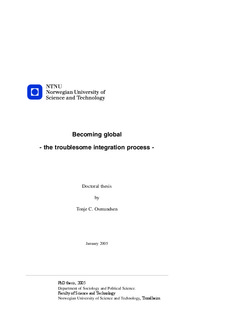| dc.contributor.advisor | Ringdal, Kristen | nb_NO |
| dc.contributor.advisor | Levin, Morten | nb_NO |
| dc.contributor.author | Osmundsen, Tonje | nb_NO |
| dc.date.accessioned | 2014-12-19T14:24:50Z | |
| dc.date.available | 2014-12-19T14:24:50Z | |
| dc.date.created | 2005-08-23 | nb_NO |
| dc.date.issued | 2005 | nb_NO |
| dc.identifier | 125674 | nb_NO |
| dc.identifier.isbn | 82-471 6913-4 | nb_NO |
| dc.identifier.uri | http://hdl.handle.net/11250/264999 | |
| dc.description.abstract | Becoming global – the troublesome integration process.
The thesis is based on research in Kongsberg Automotive and its foreign subsidiaries in Mexico, U.S.A, Poland and South Korea. It is a study of how these foreign units were established and how the head office in Norway was able to integrate these units in the organization.
The purpose of the study is to improve understanding of the challenges involved in internationalization processes. To what extent are cultural, political and social differences factors to consider when creating the international organization? In what way do actors and structures influence the process and the practices that emerge?
In an international organization cultural, political and social differences may create barriers towards understanding the other. This may be further complicated by different languages, time and geographical distances. The local manager abroad is central to the development of relations between the head office and the local unit and his perception of what is appropriate and his ability to make others agree is central to understanding the various practices and solutions that emerge in the local organization.
The main motivation and challenge of the central management is to control and coordinate the international organization. The study emphasizes the usefulness of different control mechanisms and how these attempts for control were perceived locally. Through time there was a stronger reliance on mechanisms for socialization and enculturation, and while these are directed towards creating a larger consensus in the organization, these should also be seen as means for decentralized control and self-monitoring.
The various organizational entities in Kongsberg Automotive represent different communities-of-practice and to understand the interaction between these communities as learning processes is central to the study. This perspective also confers an understanding of power as a productive element in the interaction.
The implications of this study for theory and future research are in embracing the complex nature of internationalization process. Relevant for understanding internationalization processes are both actors and structures intertwined. Institutional environments are central to an understanding of how different actors perceive practices and structures, and what they see as viable solutions. Neither the international organization nor the learning processes these undertake can be torn loose from the local cultural, political and social context. | nb_NO |
| dc.language | eng | nb_NO |
| dc.publisher | Fakultet for samfunnsvitenskap og teknologiledelse | nb_NO |
| dc.relation.ispartofseries | Doktoravhandlinger ved NTNU, 1503-8181; 2005:25 | nb_NO |
| dc.subject | Internationalization | en_GB |
| dc.subject | organization studies | en_GB |
| dc.subject | Mexico | en_GB |
| dc.subject | South Korea | en_GB |
| dc.subject | U.S.A | en_GB |
| dc.subject | Poland | en_GB |
| dc.subject | automotive | en_GB |
| dc.subject | integration | en_GB |
| dc.subject | control mechanism | en_GB |
| dc.subject | learning | en_GB |
| dc.subject | community of practice | en_GB |
| dc.subject | institutionalism | en_GB |
| dc.subject | power | en_GB |
| dc.subject | SOCIAL SCIENCES | en_GB |
| dc.title | Becoming global: The troublesome integration proces | nb_NO |
| dc.type | Doctoral thesis | nb_NO |
| dc.source.pagenumber | 257 | nb_NO |
| dc.contributor.department | Norges teknisk-naturvitenskapelige universitet, Fakultet for samfunnsvitenskap og teknologiledelse | nb_NO |
| dc.description.degree | PhD i statsvitenskap | nb_NO |
| dc.description.degree | PhD in Political Science | en_GB |
